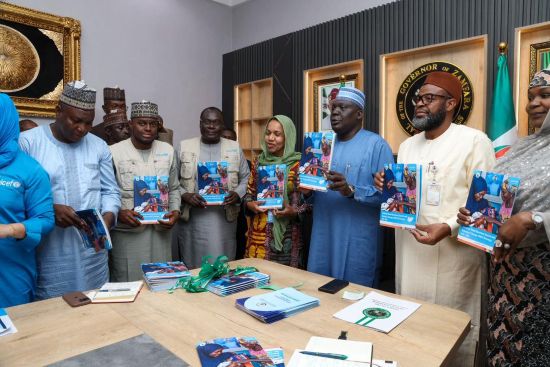UNICEF has introduced suggestion boxes and help desks in every ward across Zamfara State as part of a renewed push to strengthen feedback, accountability, and service delivery in the state’s health and nutrition sectors. The intervention follows the organisation’s latest assessment, which revealed persistent gaps affecting child survival, nutrition delivery, and education outcomes.
The initiative was unveiled on Wednesday by Ms Wafaa Saeed, UNICEF Country Representative in Nigeria, during a field engagement visit that highlighted weak feedback mechanisms, growing community dissatisfaction with Primary Healthcare Centre (PHC) services, and lapses in monitoring critical nutrition supplies.
A major concern highlighted by UNICEF was the inconsistent supervision and last-mile distribution of nutrition commodities, a challenge that continues to undermine efforts to curb severe child malnutrition. During an inspection of the State Nutrition and Health Commodities Warehouse, Ms Saeed urged authorities to strengthen oversight to ensure that Ready-to-Use Therapeutic Food (RUTF) and other essential supplies reach vulnerable children without delay. She noted that although the state’s digital tracking system had improved accountability, more rigorous, hands-on monitoring was needed.
At the Dr. Karima Primary Healthcare Centre, the UNICEF Representative interacted with caregivers and pointed out ongoing challenges in optimal child feeding. Low exclusive breastfeeding rates, limited dietary knowledge, and entrenched cultural norms were identified as key barriers. Community Nutrition Mobilizers also reported difficulties in early detection and follow-up of malnutrition cases, citing resistance, misconceptions, and mobility challenges.
To reinforce maternal health initiatives, UNICEF handed over Mama Kits to the state government to promote safe delivery and reduce reliance on unskilled birth attendants. The presentation took place during a meeting with the Deputy Governor, where Ms. Saeed also launched Zamfara’s Social and Behaviour Change (SBC) Nutrition Strategy aimed at addressing behaviour-related drivers of malnutrition.
Education concerns were also prominent during the visit. With thousands of children still out of school or learning under difficult conditions, UNICEF presented 35 School-in-a-Box kits to the Wife of the Governor to support teaching and learning in underserved and emergency-affected communities. Discussions centred around obstacles faced by girls, including poor menstrual hygiene, limited skills training, weak economic opportunities, and gaps in integrating formal and Qur’anic education systems.
During a strategic meeting, the Secretary to the State Government outlined key areas where UNICEF’s support is needed, including:
- Establishing model classrooms across all LGAs to raise teaching standards.
- Developing children’s hospitals of international standard in each Senatorial District.
- Strengthening data systems to improve evidence-based policymaking.
Ms. Saeed commended the Zamfara State Government for sustaining its commitment to tackling malnutrition through counterpart funding and the recent procurement of RUTF. However, she emphasised that stronger accountability, deeper community engagement, and more resilient systems are crucial for improving child welfare outcomes.
UNICEF’s visit underscored the urgent need to reinforce public institutions, close service-delivery gaps, and prioritise child-centred policies capable of delivering long-term, transformative change for children in Zamfara State.


